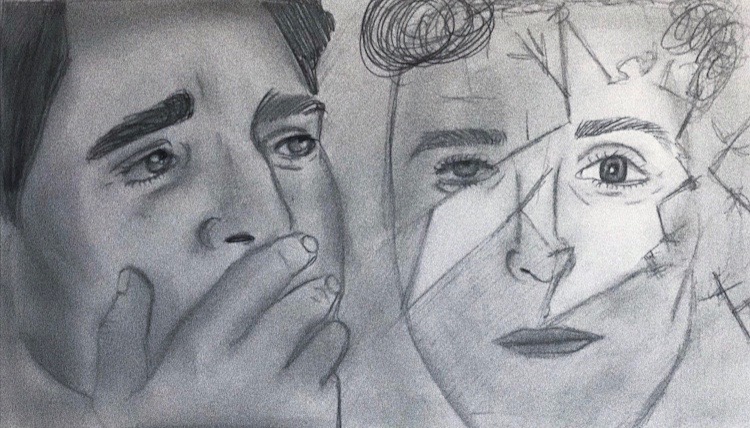“The Mind of Jake Paul” exploits mental illness for profit
November 15, 2018
When one hears the words ‘sociopath’ or ‘psychopath’ there is often an immediate reaction of fear. This occurs because of the media’s extensive history of using mental illnesses as a plot device, disregarding the negative effects that these representations have for people with these illnesses. Social media is no different.
Shane Dawson, a YouTuber with over 19 million subscribers who first became known for his short skits, has garnered much of his fame from his captivating conspiracy theory videos. However, he has recently created a documentary series exploring fellow YouTuber Jake Paul, titled “The Mind of Jake Paul.” While Jake Paul and his older brother, Logan Paul, have recently gained public attention following their rapid rise to fame on YouTube and numerous scandals, they were previously known on YouTube for making entertaining vlogs (regular, short videos about daily life), which featured pranks and bizarre stunts.
In his new series, Dawson tries to explain and seemingly justify the Pauls’ actions under the cloak of mental illness, with guidance from therapist Kati Morton. However, the combination of Dawson’s poor editing, insensitivity, and Morton’s unprofessionalism creates a series of toxic videos that do more harm for the stigma surrounding mental health than the good it claims to do.
Although Dawson claimed the series was created to serve as both an educational tool and entertainment, the factor of entertainment vastly overtakes the element of education, making it a poorly disguised horror film. Dawson adds ominous and haunting music in the background in the early episodes of his series, creating a sense of fear in the audience and condemning the word ‘sociopath.’
In the second episode, as Morton describes the indicators of antisocial personality disorder, Dawson integrates videos of Jake Paul exhibiting the claimed sociopathic traits, accompanied by sounds of shattering glass and explosions. Because the early videos have a heavy emphasis on the speculation around a ‘sociopathic’ Jake Paul, the use of this negative emotional provocation is completely inappropriate. In addition to the overediting of music and sound effects, he uses videos from outside sources, such as OJ Simpson’s trial and videos from other YouTubers, to emphasize the perceived danger of sociopathic behaviors. The entertaining and suspenseful editing causes the audience to begin to view sociopaths as dangerous people who belong in a horror movie, rather than ordinary people who have been diagnosed with a mental illness.
When addressing the negative backlash from the first videos in the series, Dawson continues to act insensitively to the situation. In a Twitter exchange, Dawson sarcastically glorifies the mental illness he first worked so hard to vilify. After a fan tweeted “Plot Twist: @shanedawson is the real sociopath…,” Dawson replied by tweeting, “haha i f***ing wish. i would be less of an emotional mess from this whole experience.” By saying that he “wishes” he had this disorder, he is making light of the symptoms of the illness in a manner that is offensive and that contributes to the societal ostracization of people with mental health issues. People with mental illness already face prejudice, but the negative media attention created by Dawson’s highly popular series further enforces the stigma and creates even more apprehension within society.
Dawson collaborates with another YouTuber, Kati Morton, a licensed therapist who creates YouTube videos about mental health. Although it’s expected that a certified therapist would add informative insights into topics with mental illness and behavior issues, her unprofessional demeanor is unnerving to those already skeptical of the series. During the second video, “The Dark Side of Jake Paul,” Morton and Dawson speak about many symptoms and actions of a ‘sociopath.’ “It’s really gross. It’s just creepy,” Morton said. Some viewers justified this language because she is describing symptoms rather than the people, but someone who is struggling with mental health may only listen to these terms without the context and feel even more self-conscious of their mental illness. The message I received from Dawson and Morton’s comments was negative and judgemental toward the people with mental illness, rather than just the symptoms and the disorder itself.
Morton also claims that some YouTubers are sociopaths or have other mental illnesses, although she draws these conclusions only through the videos posted on their channels. Not only is it concerning to see a licensed therapist speaking about undiagnosed mental illness so casually, but it also sets a precedent that people can ‘diagnose’ others with mental disorders from afar.
Although Dawson has issued countless apologies over Twitter about his YouTube videos, he still appears to be proud of his work and the effort he put into it. However, one thing remains constant: he is still benefiting from the series while the mentally ill are facing the repercussions. The eight videos in the series, reaching nearly seven hours of content, have a collective total of over 145 million views. There are advertisements before and throughout every video—continuing the generation of income for Dawson as his videos continue to get views. This video series is producing more views, subscribers, and money for Dawson and the YouTubers involved, while simultaneously harming the population of people living with this mental illness.
The large audience of people watching these videos are subjected to the negative attitudes toward mental illness in the series, and they will likely act on information gathered from the series in their everyday life. Because much of Dawson’s audience is comprised of a younger demographic of viewers, they are even more susceptible to influences from the series. Although Dawson may think he has fixed the situation with his apologies, he and those featured remain the sole beneficiaries to the profits of the series.
Shane Dawson created this series under the guise of an educational, informative video that is aimed to repaint the image of Jake Paul, but in reality, the series has only boosted his reputation as a creator and the Paul brothers’ media presence through the monstrous amount of views it has and is continuing to receive. The video series and other media using mental illness for entertainment only continue to strengthen the negative stigma that already surrounds mental illnesses that are misunderstood by society. Dawson created a thoughtless, reckless video series that has left its mark on the internet as a catalyst for the negative stigma and fear surrounding mental illnesses.


